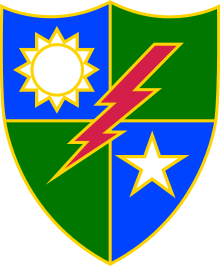4th Ranger Battalion (United States)
| 4th Ranger Battalion | |
|---|---|
| Active | 1943–1945 |
| Country |
|
| Branch |
|
| Type | Special Operations Light Infantry |
| Size | battalion |
| Engagements | Operation Husky |
| Commanders | |
| Notable commanders | Roy Murray |
Activated on 29 May 1943 in Tunisia, 4th Ranger Battalion was a Ranger unit in the United States Army during World War II.
Formation
After the success of 1st Ranger Battalion in the North Africa campaign, the Army saw the merit in small special operations units. Portions of 1st Ranger Battalion was split into 2nd, 3rd and 4th Ranger Battalions.
Training
Much like their predecessor, 4th Ranger Battalion had a strict training regimen, directed by William Orlando Darby. 3rd and 4th Battalions trained alongside each other, with members of 1st Battalion acting as training cadre. Passing along the lessons taught by the British 3 Commando Brigade, the Rangers engaged in rough training, including live-fire exercises (an uncommon practice at the time). Major Roy Murray took command of the Rangers as they prepared for their first mission.
Combat
On 10 July 1943, 4th Battalion, along with 1st and 3rd spearheaded Seventh Army's Amphibious Battle of Gela and Licata, beginning the Allied invasion of Sicily. Arriving ahead of the 1st Infantry Division, the Rangers quickly encountered the Italian 4th "Livorno" Division and the Hermann Goering Division.
Facing an overwhelming surprise attack, the Livorno Division surrendered. The Hermann Goering Division was pushed back into the city of Messina where it held off the Allied forces for the remaining German forces to escape.
See also
References
- Lock, John D. and Moore, Harold G. To Fight With Intrepidity: The Complete History of the U.S. Army Rangers 1622 to Present Fenestra Books, 2001 ISBN 1-58736-064-0
- ArmyRanger.com's history of the WWII Ranger Battalions
- Ranger.org's history of the WWII Ranger Battalions
| |||||||||||||||||||||||||||||||||||||||||||||||||
